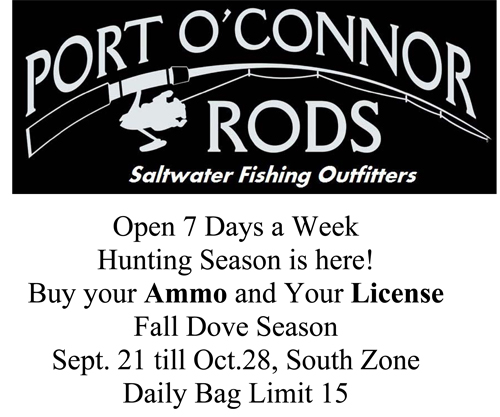AUSTIN — A bumper crop of native sunflower and other seed producing weedy plants this year have created ideal habitat conditions leading into September’s dove hunter opener. Better habitat is good for the birds, but might make hunting tougher during the early migratory game bird seasons, according to Texas Parks and Wildlife Department biologists.
“Abundant seed production, predominately sunflower and croton will help recently fledged birds to rapidly put on weight,” said Corey Mason with the Texas Parks and Wildlife Department. “But, quality range conditions could also cause doves to disperse as food sources become readily available and make managed fields less attractive early in the season.”
Texas dove season in the North and Central Dove Zones will run from Saturday, Sept. 1 through Wednesday, Oct. 24 and reopen Saturday, Dec. 22 through Sunday, Jan. 6, with a 15-bird daily bag and not more than two white-tipped doves.
The South Zone dove season will run Friday, Sept. 21 through Sunday, Oct. 28, reopening Saturday, Dec. 22 through Tuesday, Jan. 22 with a 15-bird daily bag and not more than two white-tipped doves.
The Special White-winged Dove Area will be restricted to afternoon-only (noon to sunset) hunting the first two full weekends in September running from Sept. 1-2 and 8-9 and reopen when the regular South Zone season begins on Friday, Sept. 21 through Sunday, Oct. 28 and again from Saturday , Dec. 22 through Friday, Jan. 18. The Special White-winged Dove Area season takes four of the allowable 70 days, so when the regular season opens, this area must close four days earlier than the rest of the South Zone. During the early two weekends, the daily bag limit is 15 birds, to include not more than four mourning doves and 2 white-tipped doves. Once the general season opens, the aggregate bag limit will be 15 with no more than 2 white-tipped doves.
“I’m seeing lots of growth of sunflowers, crotons, and other early-succession stage ‘weeds’ that should provide abundant food sources and hunting opportunities when they ripen in the fall,” said Mike Krueger, TPWD district biologist in Kerrville.
“Most of the Trans-Pecos is holding good numbers of doves at this point,” said Jason Wagner, TPWD biologist in Fort Stockton. “There are plenty of seed producing forbs and good tank water that should hold the birds until season. Last year’s wildfires also created good dove habitat by allowing for forb growth and bare ground that mourning doves prefer for feeding. Usually the best dove hunting in the Trans-Pecos can be found around dirt tanks in the evenings. Also look for dove concentrations around the wildfire areas feeding on seeds.”
For hunters looking for hunting opportunities on public lands, check out TPWD’s Public Hunting Program, TPWD offers affordable access to quality hunting experiences with the purchase of a $48 Annual Public Hunting (APH) Permit.
Permit holders have access to more than 100 hunting units leased from private landowners specifically for dove and small game. An online map feature allows for “virtual scouting” of these areas. By clicking on the locator points, you can follow links to detailed aerial maps with highlighted boundaries and links to information pages from the APH information map booklet. A downloadable Google Earth file (.kml) is also available that contains all the boundary information along with links to the corresponding APH map booklet pages.
Hunters are reminded that in addition to a valid Texas hunting license, a state Migratory Game Bird Stamp, and certification in the Harvest Information Program (HIP) is required. HIP certification is offered when you buy your license and involves responding to a few simple questions about your migratory game bird harvest during the previous season. Hunting licenses expire annually on Aug. 31.

